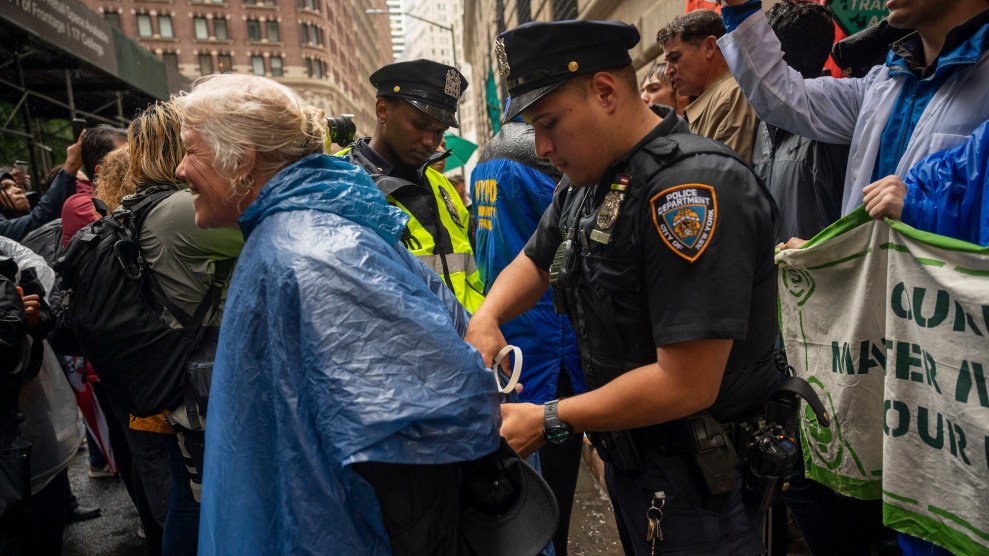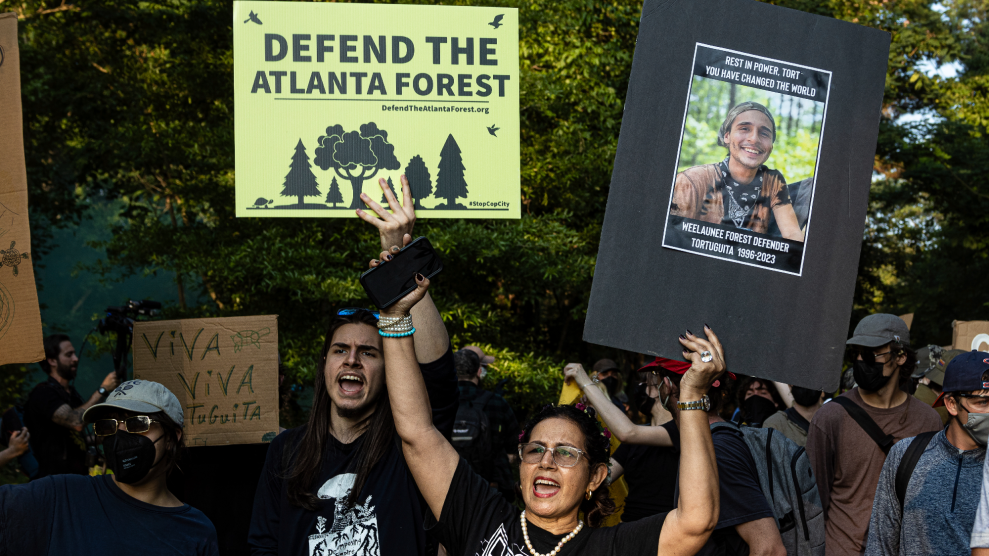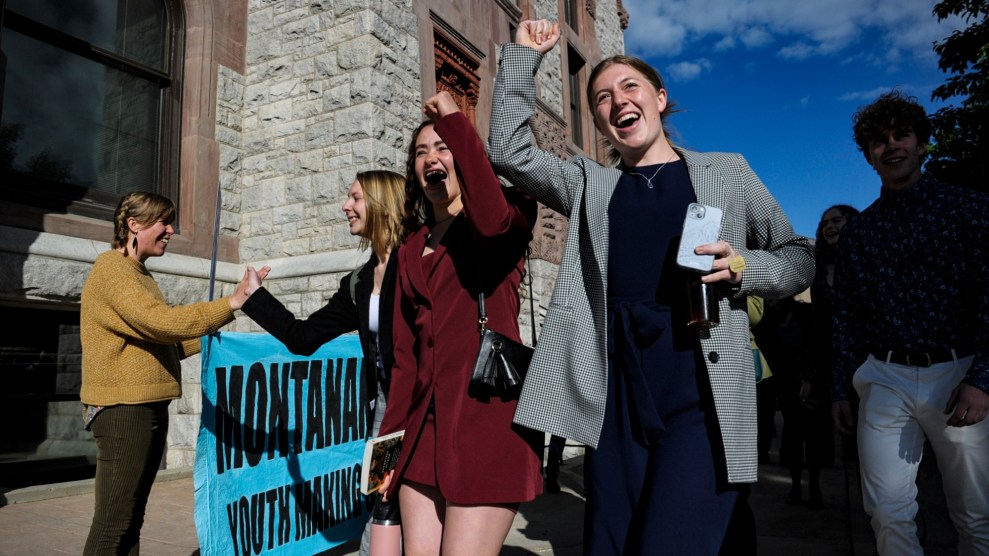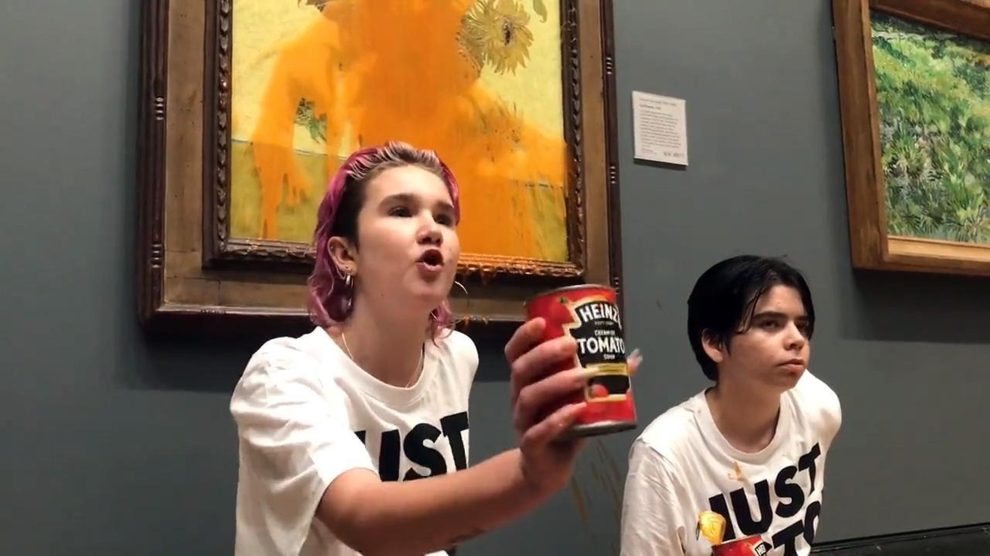
Monday's action was organized by a coalition of groups including New York Communities for Change and Extinction Rebellion NYC.Matthew Rodier/Sipa USA/AP
This story was originally published by the Guardian and is reproduced here as part of the Climate Desk collaboration.
One day after the largest climate march since the start of the Covid pandemic, hundreds of climate activists blockaded the Federal Reserve Bank in New York to call for an end to funding for coal, oil and gas, with police making scores of arrests.
“Fossil fuel companies…wouldn’t be able to operate without money, and that money is coming primarily from Wall Street,” Alicé Nascimento, environmental campaigns director at New York Communities for Change, said hours before she was arrested.
The action came as world leaders began arriving in New York for the United National General Assembly gathering and followed Sunday’s 75,000-person March to End Fossil Fuels, which focused on pushing Biden to urgently phase out fossil fuels. Monday’s civil disobedience had a different but compatible goal, said Renata Pumarol, an organizer with the campaign group Climate Defenders.
“Today we want to make sure people know banks, big banks, are responsible for climate change, too,” she said. “And while marches are important, we think civil disobedience is, too, because it shows we’re willing to do whatever it takes to end fossil fuels, including putting ourselves on the line.”
Monday’s action was organized by a coalition of local organizations including New York Communities for Change and Extinction Rebellion NYC, alongside national groups such as Climate Organizing Hub and 350.org. Demonstrators first gathered in New York’s Zuccotti Park, in the financial district in lower Manhattan, which is partially owned by the fossil fuel investor Goldman Sachs.
The small concrete urban space was the base for the original Occupy Wall Street protests 12 years ago.
On Monday, demonstrators then marched in the rain to the nearby New York Federal Reserve building, the largest of the network of 12 federal banks dotted around the country that make up the central bank of the United States.
Protesters blockaded multiple entrances into the bank while singing, beating drums and holding up signs. More than 100 people were arrested, according to the New York City office of the deputy commissioner for public information, with organizers estimating that roughly 150 arrests were made. “If you arrest one of us, 100 more will come,” activists chanted.
The protesters called attention to both public and private fossil fuel financing. Globally, government subsidies for coal, oil and gas reached a record high of $13 million a minute in 2022 last year—equivalent to 7 percent of global GDP and almost double what the world spends on education—according to the International Monetary Fund.
Last year, the US also ranked 16th among the G20 countries on a scorecard by the independent economic research group Green Central Banking, which the researchers say indicates US financial regulators are falling behind their international peers on climate risk mitigation.
Meanwhile, since the signing of the 2015 Paris climate agreement, major private banks have provided some $3.2 trillion to the fossil fuel industry to expand operations, far outstripping the amount that global north governments have collectively spent on international climate finance, an analysis from ActionAid, the Washington DC-based non-profit, found this month. Another recent analysis from the Sierra Club environmental group found that major global banks have announced climate pledges but nonetheless financed coal energy across the US.
Monday’s action came after a slew of global protests last week, some of which targeted financial institutions. In New York, dozens rallied outside the headquarters for the asset manager BlackRock and Citibank on Wednesday and Thursday respectively, to call attention to both firms’ investments in fossil fuels. And on Friday, protesters targeted the Museum of Modern Art over its relationship with the fossil fuel investor KKR.
Another protest is planned for Tuesday at New York City’s Bank of America offices, with additional actions throughout the week as the United Nations hosts its Climate Ambition Summit as part of the UNGA.















